
SEASON 32(1960-61)
Not for Aunt Edna
The Tempest
The Glass Menagerie
Misalliance
The Ticket of Leave Man
Waiting For Godot
Ghosts
Charley's Aunt
Serjeant Musgrave's Dance
September 1960
"NOT FOR AUNT EDNA"
THE LESSON
by Eugene Ionesco, translated by Donald Watson
PROFESSOR TARANNE
by Arthur Adamov, translated by Peter Meyer
CHRISTOPHER COLUMBUS
by Michel De Ghelderode, translated by George Hanger
Directed by Michael Almaz, designed by Tadeusz Orlowicz
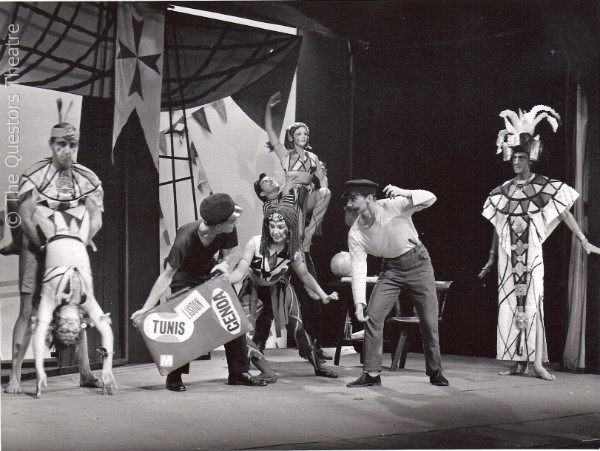
“Aunt Edna” was of course the infamous character invented by Terence Rattigan to justify his pursuit of popular success in the theatre and without whose approval, he said, plays would "wither and die"- although he did concede that "the old dear rather enjoys a little teasing and even, at times, some bullying." Well this, the opening programme of the Questors' 32nd Season (the last Season but one to be held in the Tin Hut), might be regarded as Questors' attempt to bully her into submission.
This was the first of several shows to be designed for us by Tadeusz Orlowicz, who had been a prominent figure in pre-war Polish theatre. He has been described as one of Poland's most creative stage designers with a distinctive style valuing "grotesque, intellectual games, and toying with conventions." After the war he fell victim to the communist authorities who "erased him from the national memory" when he moved to London. Alfred Emmet described him as "one of the most distinguished stage designers to have worked at The Questors. Particularly adept at making much out of the simplest things, he made many imaginative contributions to our work in the old tin hut theatre." He is also remembered for his striking set for Brand, the opening production in the new playhouse (1964).
It was Michael Almaz's first production after The Birthday Party (1959), and his next before Waiting for Godot (see below). More about him later.
Reviewing this production, The Stage described how Almaz had treated Christopher Columbus [photo above] "almost in the form of a traditional pantomime. The choreography of Ludmila Mlada ...and the skill with which she has trained the cast in its execution, makes a stimulating and decorative addition to the production, as does the brilliantly economical décor by Tadeusz Orlowicz."
Douglas McVay in the Middlesex County Times waxed lyrical in his review of The Lesson.
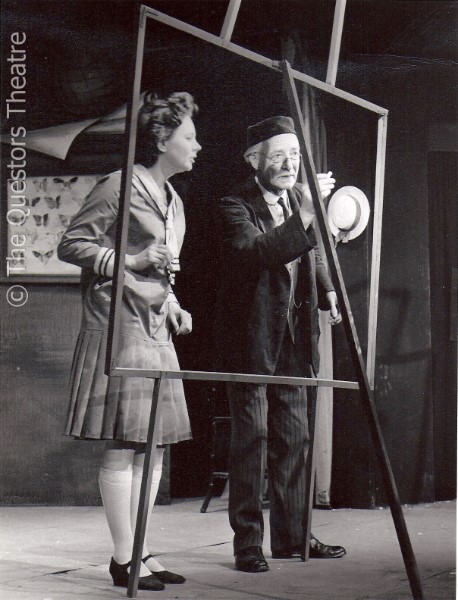 "... the piece’s terrible, hilarious eroticism, which has been apparent beneath its lampooning and laughter throughout now shines finally, flagrantly forth as the old man at last discovers the sole way he may communicate with his pain-preoccupied charge, via more pain but a different pain - an ache of the senses that causes her to forget the mere aching of her teeth, and anguished abandonment to pleasure which culminates in the orgasmic repetition of the word “knife” and his phallic stabbing of her with a dagger. "Aaah!” breathes the master in a long-drawn sigh of satiety, “Now I feel better.”
"... the piece’s terrible, hilarious eroticism, which has been apparent beneath its lampooning and laughter throughout now shines finally, flagrantly forth as the old man at last discovers the sole way he may communicate with his pain-preoccupied charge, via more pain but a different pain - an ache of the senses that causes her to forget the mere aching of her teeth, and anguished abandonment to pleasure which culminates in the orgasmic repetition of the word “knife” and his phallic stabbing of her with a dagger. "Aaah!” breathes the master in a long-drawn sigh of satiety, “Now I feel better.”
McVay, however, didn't care much for Christopher Columbus :
"...turgid would-be satire, written in 1927 and only now granted its British premiere. Neither gay Tadeusz Orlowicz sets and costumes stopped me thinking I could cheerfully have waited a few more years."
October 1960
THE TEMPEST
by William Shakespeare
Directed by Jeffrey Smith
Designed by Colin Garland
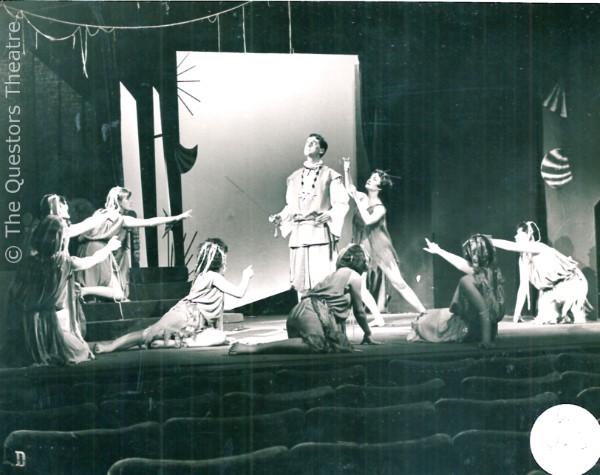
Our press release for this production welcomed "two new hands" to the Questors production team.
"Jeffrey Smith, is a Yorkshireman who turned to production when a road accident interrupted a career as an actor. He commuted for some time between civic theatres in Bradford and Leeds gaining plenty of highbrow experience, and has balanced it by contributing to and producing revues at Leeds celebrated music hall City Varieties.
"The set - an important matter in “The Tempest” - has been designed by Colin Garland a young Australian. He began at Sydney Arts School and now runs an antique stall in Portobello Road while he has done sets for the Royal court Theatre."
This was Colin Garland's only design for The Questors, but Jeffrey Smith went on to became one of our regular and most respected directors right up until his sudden death in 1989.
Douglas McVay, in the Middlesex County Times writes:
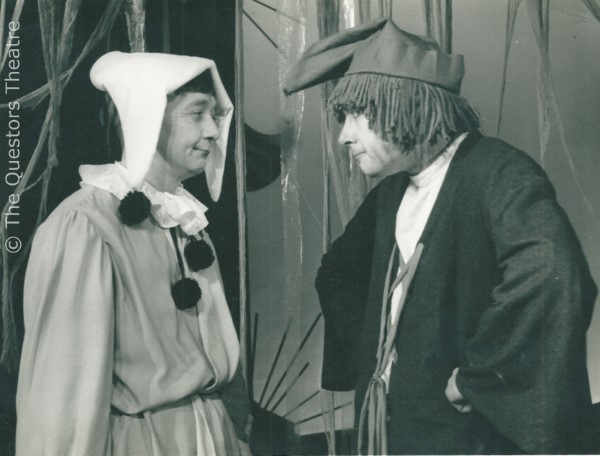 "No-one better than Kenneth Conington to remind us that Prospero is an exiled ruler,
not a cranky old conjuror. No-one better than Ned Gethings to point the child-like naivete and lyricism in Caliban's brutish ruminations. The wig worn by Michael Green [right] as Stephan resembles nothing so much as a scarlet floor mop, yet this only adds to the fun of a characteristically witty cameo,...which - helped by Ted Scrivener's button-faced droll Trinculo - brings the first half of the evening to an exuberant close."
"No-one better than Kenneth Conington to remind us that Prospero is an exiled ruler,
not a cranky old conjuror. No-one better than Ned Gethings to point the child-like naivete and lyricism in Caliban's brutish ruminations. The wig worn by Michael Green [right] as Stephan resembles nothing so much as a scarlet floor mop, yet this only adds to the fun of a characteristically witty cameo,...which - helped by Ted Scrivener's button-faced droll Trinculo - brings the first half of the evening to an exuberant close."
November 1960
THE GLASS MENAGERIE
by Tennessee Williams
Directed by Alfred Emmet
Designed by John Rolfe
There are no archive photos of this production, which is a pity as it wasn't only the first production in the Stanislavsky Room, it was our first venture into theatre-in-the-round - as the programme note explained:
This is the first of a series of productions to be given in-the-round. The purpose is largely experimental - not that production in this now well-established manner is of itself any longer experimental, but it is an experiment for us, a new experience in which you, the audience, will share.
What are the advantages and what the disadvantages of bringing the play into such
intimate relationship with the audience?
What new techniques have to be mastered?
What shift of values is involved?
By approaching these problems without prejudice, we hope to learn.
You can help us to learn by coming to the Discussion on Sunday, 27th November, at 7.30 p.m.
Douglas McVay, in the Middlesex County Times, wrote:
"The piece...is graced by the most accomplished acting I have seen at Mattock Lane since "THE BIRTHDAY PARTY" last December. Two performances amaze. Jo Arundel turns the mother into a quintessentially Williamsian personification of crumbling elegance laughable, rapacious and pathetic in her nagging Southern sing-song where every other sentence seems to finish on a query. And Tony Worth lives the part of the intended groom with a spontaneous ease and confidence, a gaiety and warmth, a tact and understanding and simple kindness which are quite extraordinary. Mr. Worth's handling of the long, delicate duologue with Miss Kenny [Jan Kenny as Laura] sets the crown on this memorable evening."
December 1960
MISALLIANCE
by Bernard Shaw
Directed by Peter Whelan
Designed by Nigel Woolner
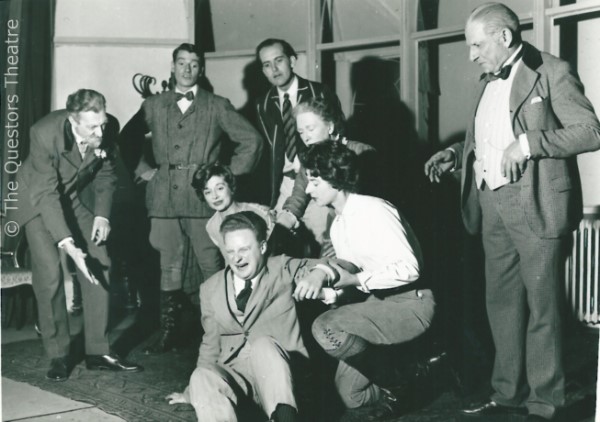
This was Peter Whelan's first full production and the first of two sets designed by Nigel Woolner (the photographs are of a rehearsal and not on the set).
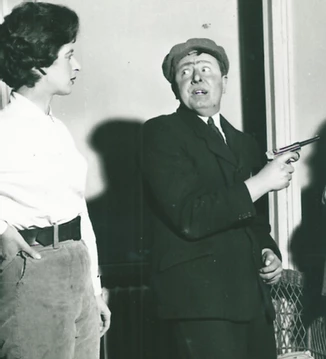 In his review in the Middlesex County Times, Douglas McVay remarked on "Paul Imbusch, whose performance as the twitching, Bluebottle-piping Kentish Town anarchist [right] , complete with fearfully clutched pistol, cloth cap and brown boots, maintains a hilarity expert enough for any London revival".
In his review in the Middlesex County Times, Douglas McVay remarked on "Paul Imbusch, whose performance as the twitching, Bluebottle-piping Kentish Town anarchist [right] , complete with fearfully clutched pistol, cloth cap and brown boots, maintains a hilarity expert enough for any London revival".
December 1960
THE TICKET OF LEAVE MAN
by Tom Taylor
Directed by Michael Green
Designed by C Wild
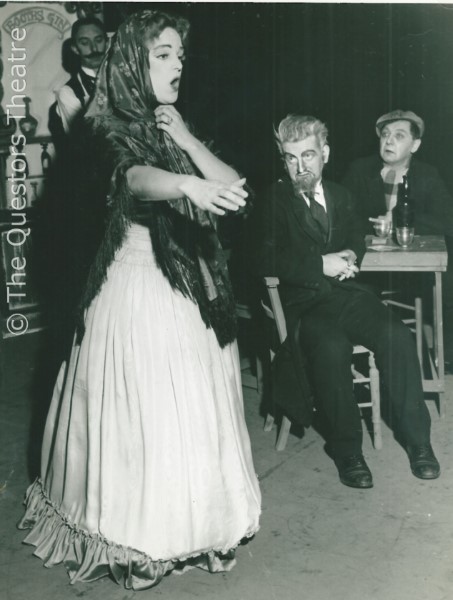 "THE TICKET-OF-LEAVE MAN is an 1863 stage melodrama in four acts by the British writer Tom Taylor, based on a French drama, LE RETOUR DE MELUN. It takes its name from the Ticket of Leave issued to convicts when they were released from jail on parole. A recently returned convict is blackmailed by another man into committing a robbery, but is rescued thanks to the intervention of a detective. It has been described as probably being the first play about a detective." [Wikipedia]
"THE TICKET-OF-LEAVE MAN is an 1863 stage melodrama in four acts by the British writer Tom Taylor, based on a French drama, LE RETOUR DE MELUN. It takes its name from the Ticket of Leave issued to convicts when they were released from jail on parole. A recently returned convict is blackmailed by another man into committing a robbery, but is rescued thanks to the intervention of a detective. It has been described as probably being the first play about a detective." [Wikipedia]
Douglas McVay in the Middlesex County times, praised Philip Wright for his deerstalkered detective.
"Hawkshaw is the best, the least fussy, the most wittily disciplined performance I have seen Mr Wright give: and his chivalrous decision to ignore the prison record -"Poor devil, he paid his debt at Portland" - drew from me louder applause than anything else in the show."
He also lauded Jennifer Oscard's delivery of
"the sensation ballad "The Maniac's Tear," which an 1863 Jukebox Jury would unquestionably have voted a hit."
January 1961
WAITING FOR GODOT
by Samuel Beckett
Directed by Michael Almaz
Designed by Tony Carruthers
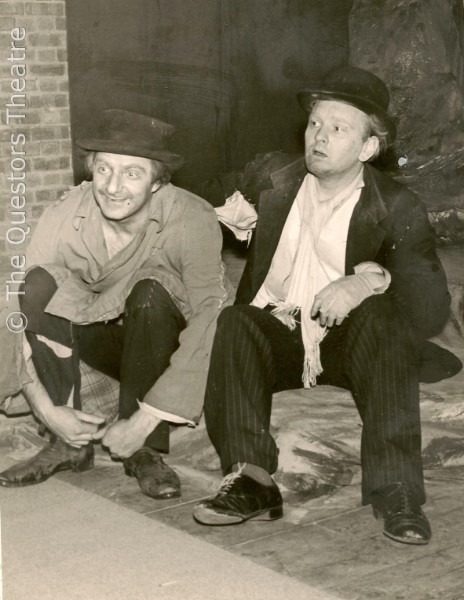
The second production in the Stanislavsky Room, the second production in-the-round, the first of four Questors productions of Beckett's masterpiece - but Douglas McVay in the Middlesex County Times didn't like it!
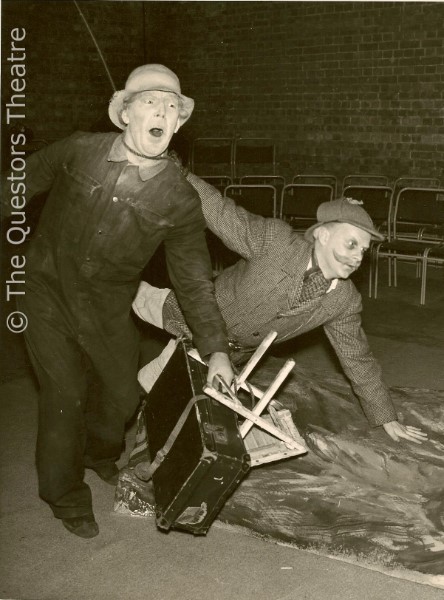 "I've nothing against abstraction, or surrealism, or fantasy. I don't demand that a play have lots of plot, or lots of character, or lots of everyday detail. I only ask that it have sufficient unto the day, or rather the evening: sufficient for me to feel that the evening has been worth spending... I don’t find the piece profound, I don’t find it profoundly moving, or profoundly funny. Instead I find it tentative, occasionally moving, and occasionally funny...The most exciting thing in it, significantly, is scarcely literary, but musical: the servant’s huge, incoherent, breakneck babble at the end of Act One."
"I've nothing against abstraction, or surrealism, or fantasy. I don't demand that a play have lots of plot, or lots of character, or lots of everyday detail. I only ask that it have sufficient unto the day, or rather the evening: sufficient for me to feel that the evening has been worth spending... I don’t find the piece profound, I don’t find it profoundly moving, or profoundly funny. Instead I find it tentative, occasionally moving, and occasionally funny...The most exciting thing in it, significantly, is scarcely literary, but musical: the servant’s huge, incoherent, breakneck babble at the end of Act One."
 However, notwithstanding McVay closing ranks with Aunt Edna on this one, it should be noted that the director Michael Almaz [left] was something of a Beckett pioneer. An article on Haaretz.com entitled "Israel Didn't Have to Wait Long for Mr. God" begins as follows:
However, notwithstanding McVay closing ranks with Aunt Edna on this one, it should be noted that the director Michael Almaz [left] was something of a Beckett pioneer. An article on Haaretz.com entitled "Israel Didn't Have to Wait Long for Mr. God" begins as follows:
"Israeli theater discovered Beckett and WAITING FOR GODOT long before the rest of the world did. Michael Almaz translated and directed the play in 1955 at the Zira (Arena) theater, under the name "ANU MEHAKIM LE'MAREL" ("We Are Waiting for Mr. God").
Another site refers to Michael Almaz as responsible for "two landmark productions [in Tel-Aviv]: Samuel Beckett’s ‘WAITING FOR GODOT’ (1953, before the London and New York premieres), Eugene Ionesco’s ‘THE BALD PRIMA DONNA’ and ‘THE LESSON’ (1955)."
Almaz directed THE LESSON earlier in this Questors season [see above] and of course he is famous to us for having directed THE BIRTHDAY PARTY in 1959.
It is tantalising and a little frustrating that in all the accounts I have found of his long and distinguished career as a director and producer, his work with us and other English amateur groups during the sixties never seems to get a mention.
Footnote:
The production was revived for 3 nights in July with the prospect of taking it to the Edinburgh Festival Fringe. That visit doesn't seem to have materialised but it did go to the Essex County Agricultural College Writtle, Nr Chelmsford for one performance in August.
January 1961
GHOSTS
by Henrik Ibsen
translated by Norman Ginsbury
Directed by Dorothy Freedman & Alfred Emmet
Designed by Marjorie Golsby
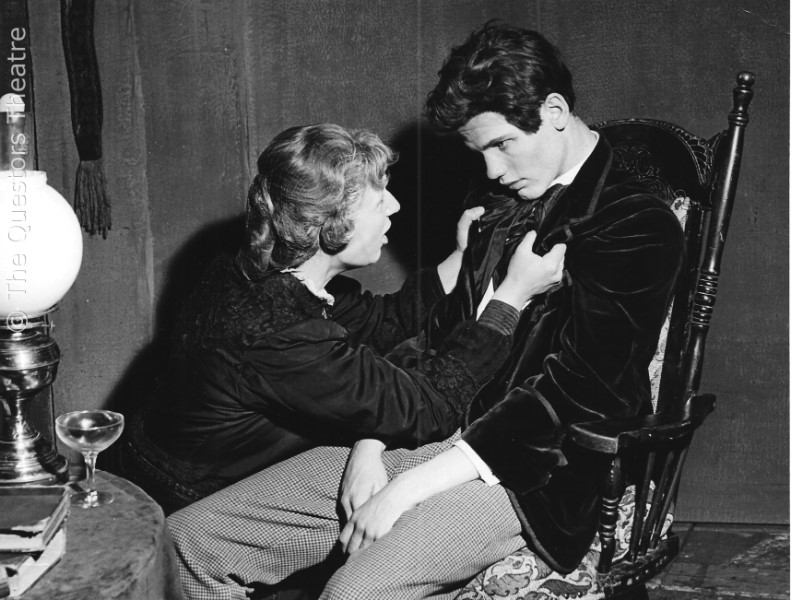
This slot had originally been set for Arthur Miller's adaptation of Ibsen's AN ENEMY OF THE PEOPLE, but for some reason, which I haven't been able to discover but which was probably to do with casting problems attached to the larger scale production, it was replaced at the last moment with this revival of GHOSTS, which Alfred Emmet had previously directed in 1946. This time he co-directed with Dorothy Freedman, her one and only production at Questors.
The young actor Bill Hall who played Oswald was a visiting student from the USA and was briefly a member of the Student Group, although he doesn't seem to have been involved in any of their productions.
Douglas McVay, in the Middlesex County Times, was very impressed with his performance:
"Oswald's terrifying return to infantilism, his slack-jawed, monotonous repetition of "Mother, give me the sun . . . the sun . . . the sun," surely ranks amongst the most cathartic concluding lines in all Ibsen... The Strasbergian head-shaking, brow-knotting, palm-clenching and pacing of young American actor Bill Hall proves surprisingly suited to Oswald's restlessly taut premonitions of doom."
In 2015 Bill Hall paid a brief return visit to the UK and looked us up. I was able to show him the photos and the above glowing review, as well as a letter to Alfred from Sheila Moriarty - who hated everything about the production - except Bill!
March 1961
CHARLEY'S AUNT
by Brandon Thomas
with original songs by Barbara Hutchins and Vincent McQueen
Directed by Barbara Hutchins
Designed by Nigel Woolner
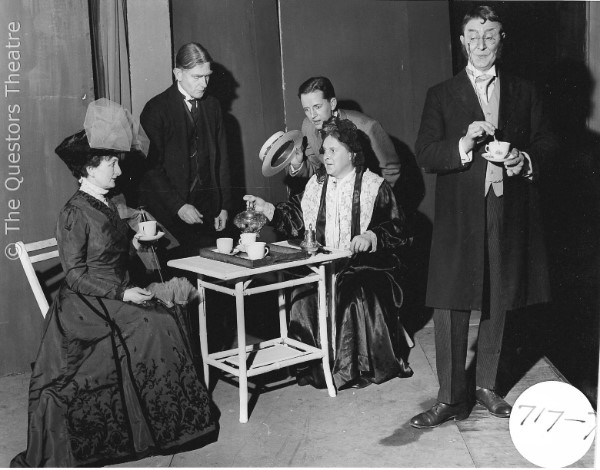
This was the first of four revivals we have undertaken of this evergreen, this one with original music by Kit Emmet and Vincent McQueen.
George Ritchie (Lord Fancourt Babberly) was described by Douglas McVay (Middlesex County Times) as "an intriguing cross between Benny Hill and a Queen Victoria slightly in need of a shave."
What more can one say?
April 1961
SERJEANT MUSGRAVE'S DANCE
by John Arden
Directed by Michael Cromar
Designed by Ian Topis
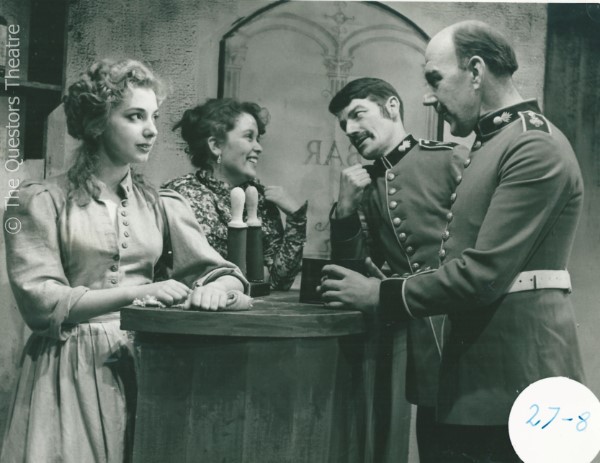
Not much to reveal about this production except that it was the only one to be directed by Michael Cromar and it seemed to confuse Douglas McVay in the Middlesex county Times:
"Slow. rambling. obscure episodic narrative-line for at least two acts, with sex and violence tossed in for no particular reason. And dialogue which continually see-saws between profanity and pretentious poeticizing."


 "... the piece’s terrible, hilarious eroticism, which has been apparent beneath its lampooning and laughter throughout now shines finally, flagrantly forth as the old man at last discovers the sole way he may communicate with his pain-preoccupied charge, via more pain but a different pain - an ache of the senses that causes her to forget the mere aching of her teeth, and anguished abandonment to pleasure which culminates in the orgasmic repetition of the word “knife” and his phallic stabbing of her with a dagger. "Aaah!” breathes the master in a long-drawn sigh of satiety, “Now I feel better.”
"... the piece’s terrible, hilarious eroticism, which has been apparent beneath its lampooning and laughter throughout now shines finally, flagrantly forth as the old man at last discovers the sole way he may communicate with his pain-preoccupied charge, via more pain but a different pain - an ache of the senses that causes her to forget the mere aching of her teeth, and anguished abandonment to pleasure which culminates in the orgasmic repetition of the word “knife” and his phallic stabbing of her with a dagger. "Aaah!” breathes the master in a long-drawn sigh of satiety, “Now I feel better.”
 "No-one better than Kenneth Conington to remind us that Prospero is an exiled ruler,
not a cranky old conjuror. No-one better than Ned Gethings to point the child-like naivete and lyricism in Caliban's brutish ruminations. The wig worn by Michael Green [right] as Stephan resembles nothing so much as a scarlet floor mop, yet this only adds to the fun of a characteristically witty cameo,...which - helped by Ted Scrivener's button-faced droll Trinculo - brings the first half of the evening to an exuberant close."
"No-one better than Kenneth Conington to remind us that Prospero is an exiled ruler,
not a cranky old conjuror. No-one better than Ned Gethings to point the child-like naivete and lyricism in Caliban's brutish ruminations. The wig worn by Michael Green [right] as Stephan resembles nothing so much as a scarlet floor mop, yet this only adds to the fun of a characteristically witty cameo,...which - helped by Ted Scrivener's button-faced droll Trinculo - brings the first half of the evening to an exuberant close."
 In his review in the Middlesex County Times, Douglas McVay remarked on "Paul Imbusch, whose performance as the twitching, Bluebottle-piping Kentish Town anarchist [right] , complete with fearfully clutched pistol, cloth cap and brown boots, maintains a hilarity expert enough for any London revival".
In his review in the Middlesex County Times, Douglas McVay remarked on "Paul Imbusch, whose performance as the twitching, Bluebottle-piping Kentish Town anarchist [right] , complete with fearfully clutched pistol, cloth cap and brown boots, maintains a hilarity expert enough for any London revival". "THE TICKET-OF-LEAVE MAN is an 1863 stage melodrama in four acts by the British writer Tom Taylor, based on a French drama, LE RETOUR DE MELUN. It takes its name from the Ticket of Leave issued to convicts when they were released from jail on parole. A recently returned convict is blackmailed by another man into committing a robbery, but is rescued thanks to the intervention of a detective. It has been described as probably being the first play about a detective." [Wikipedia]
"THE TICKET-OF-LEAVE MAN is an 1863 stage melodrama in four acts by the British writer Tom Taylor, based on a French drama, LE RETOUR DE MELUN. It takes its name from the Ticket of Leave issued to convicts when they were released from jail on parole. A recently returned convict is blackmailed by another man into committing a robbery, but is rescued thanks to the intervention of a detective. It has been described as probably being the first play about a detective." [Wikipedia]
 "I've nothing against abstraction, or surrealism, or fantasy. I don't demand that a play have lots of plot, or lots of character, or lots of everyday detail. I only ask that it have sufficient unto the day, or rather the evening: sufficient for me to feel that the evening has been worth spending... I don’t find the piece profound, I don’t find it profoundly moving, or profoundly funny. Instead I find it tentative, occasionally moving, and occasionally funny...The most exciting thing in it, significantly, is scarcely literary, but musical: the servant’s huge, incoherent, breakneck babble at the end of Act One."
"I've nothing against abstraction, or surrealism, or fantasy. I don't demand that a play have lots of plot, or lots of character, or lots of everyday detail. I only ask that it have sufficient unto the day, or rather the evening: sufficient for me to feel that the evening has been worth spending... I don’t find the piece profound, I don’t find it profoundly moving, or profoundly funny. Instead I find it tentative, occasionally moving, and occasionally funny...The most exciting thing in it, significantly, is scarcely literary, but musical: the servant’s huge, incoherent, breakneck babble at the end of Act One." However, notwithstanding McVay closing ranks with Aunt Edna on this one, it should be noted that the director Michael Almaz [left] was something of a Beckett pioneer. An article on Haaretz.com entitled "Israel Didn't Have to Wait Long for Mr. God" begins as follows:
However, notwithstanding McVay closing ranks with Aunt Edna on this one, it should be noted that the director Michael Almaz [left] was something of a Beckett pioneer. An article on Haaretz.com entitled "Israel Didn't Have to Wait Long for Mr. God" begins as follows:

